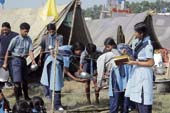 |
| Water, acutely scarce in the Rajarhat fields where the Scouts and Guides have pitched camp, is being recycled to wash utensils after a meal. Picture by Sanat Kumar Sinha |
It is one of the biggest gatherings of children in this part of the world. It has turned into a disaster zone.
The Special National Jamboree of The Bharat Scouts and Guides is being held at Rajarhat to mark the centenary of the Scout movement. There are 16,000 boys and girls here. But they have to look where they are going — stretches of the 100-odd acres, off the showpiece road where the 2,000 tents have been pitched, are covered with excreta.
For, there is no water. The makeshift toilets have not been cleaned from January 2, when the six-day event started. The stench is the worst near the 700 tents set up for the Guides. The toilets are so unclean that the girls have been using the field that lies between their tents and the toilets.
By the third day, the field is also covered with excreta. “For more than a day, I couldn’t relieve myself,” said a Class X student from Bangladesh. “Yesterday, I only used the toilet when I had to. The national jamboree in Gazipur, in Bangladesh, was much better organised.”
 |
| A Scout quenches his thirst from a pouch of drinking water, bought for Rs 2. Picture by Sanjoy Chattopadhyaya |
Said a distraught mother from the city: “We are appalled. A few of us parents are sneaking into the camp to supply food and drinking water. Ten children have been crammed into one tent.”
The sewage drains are clogged, thanks to scarcity of water. “It is a mess,” cringed Bipasana, a Class VII student from Nepal.
About 40 divisions of Scouts and Guides are participating in the event hosted by West Bengal State Association of The Bharat Scouts and Guides. Most are from India, with a handful from Bangladesh, Sri Lanka, Portugal and Macau-China.
“We are forced to cross the field to go to the toilet, so we are avoiding it at night,” said a girl from Punjab. “There was not a single drop of water available on January 3,” added a Class VIII student from Bihar.
Boys’ toilets are no better. Participants said they are forced to buy drinking water: Rs 2 for a pouch and Rs 5 for a bucket. Abhijit Das, a student of South Suburban School in the city, said: “You can go without taking a bath or washing your clothes, but you have to drink water.”
Participants from Bihar and Jharkhand said they were buying buckets of water every day.
Water for cooking and washing, from deep tubewells, is also scarce. It has made cooking difficult and food from vendors outside is expensive. “A large guava costs Rs 6, while grapes are being sold at Rs 140 per kg. In no other state have we encountered such an appalling condition,” said a scout.
“We are supposed to be provided with electric lights near the tents. But either they are not close to the tents or there are not enough lights. We are forced to light candles inside the tents, although it is against the safety rules. There is also no question of local transport being provided for excursions,” he complained.
The organisers admit that things haven’t gone according to plan. “There’s a scarcity,” said Siddhartha Mukherjee, Rover’s Scout Leader, a senior Scout leader from Bengal. “The toilets are cleaned four to five times a day. If the water runs short, it becomes a problem.”
The organisers had expected more help from the state, which has agreed to sanction Rs 15 lakh.
Noel B. Sabandal, liaison officer of World Scouts Bureau, Asia Pacific Region, said there was scarcity of provisions, “but scouts have to adjust to such situations”.
However, a scout from Class XII said: “A little hardship is fine, but this is torture. I was at the 15th National Jamboree of The Bharat Scouts & Guides in October 2005 at Hardwar. It was far better.”










